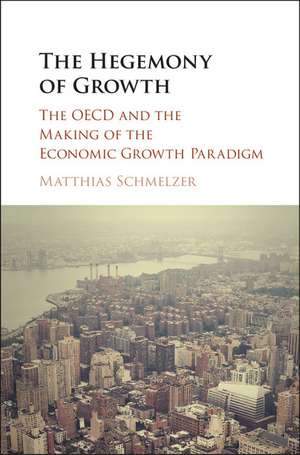The Hegemony of Growth: The OECD and the Making of the Economic Growth Paradigm
Autor Matthias Schmelzeren Limba Engleză Hardback – 16 mai 2016
| Toate formatele și edițiile | Preț | Express |
|---|---|---|
| Paperback (1) | 239.17 lei 3-5 săpt. | +20.40 lei 7-11 zile |
| Cambridge University Press – 18 oct 2017 | 239.17 lei 3-5 săpt. | +20.40 lei 7-11 zile |
| Hardback (1) | 757.52 lei 6-8 săpt. | |
| Cambridge University Press – 16 mai 2016 | 757.52 lei 6-8 săpt. |
Preț: 757.52 lei
Preț vechi: 880.83 lei
-14% Nou
Puncte Express: 1136
Preț estimativ în valută:
144.97€ • 157.41$ • 121.77£
144.97€ • 157.41$ • 121.77£
Carte tipărită la comandă
Livrare economică 22 aprilie-06 mai
Preluare comenzi: 021 569.72.76
Specificații
ISBN-13: 9781107130609
ISBN-10: 1107130603
Pagini: 396
Ilustrații: 6 b/w illus. 2 tables
Dimensiuni: 159 x 237 x 26 mm
Greutate: 0.68 kg
Editura: Cambridge University Press
Colecția Cambridge University Press
Locul publicării:New York, United States
ISBN-10: 1107130603
Pagini: 396
Ilustrații: 6 b/w illus. 2 tables
Dimensiuni: 159 x 237 x 26 mm
Greutate: 0.68 kg
Editura: Cambridge University Press
Colecția Cambridge University Press
Locul publicării:New York, United States
Cuprins
Introduction; Setting the stage: a historical introduction to the OECD; Part I. Paradigm in the Making: The Emergence of Economic Growth as the Key Economic Policy Norm (1948–59): 1. Measuring growth: the international standardization of national income accounting; 2. Propagating growth: from reconstruction and stability to 'selective expansion' and 'productivity'; 3. 'Expand or die': international economic mandarins and the transnational harmonization of growth policies; Part II. Paradigm at Work: A 'Temple of Growth for Industrialized Countries' in Action (1960–8): 4. Power, progress, and prosperity: growth as universal yardstick and the OECD's 1961 growth target in perspective; 5. Boosting growth: the Western 'growth conscience' and policies in the name of accelerated growth; 6. Replicating growth: the 'development of others' and the hegemony of donor countries; Part III. Paradigm in Discussion: The 'Problems of Modern Society', Environment, and Welfare (1969–74): 7. Quantity in question: challenging the hegemony of growth and the OECD-Club of Rome nexus; 8. Reclaiming growth: organizational dynamics and the 'dialectic' of qualitative growth; 9. Quantifying quality: managing the environmental costs of growth and the difficult quest for 'gross national well-being'; Epilogue: paradigm remade (1975–2011); Conclusion: provincializing growth.
Recenzii
'In this well-researched intellectual and institutional history, Schmelzer brings to light the story of how Europe and America in the mid-twentieth century embraced the cult of Gross National Product (GNP), and the role of the Organization for Economic Cooperation and Development (OECD) in the process. By devising the system by which governments keep economic score, economists and bureaucrats revised the goals of economic policy to emphasize, almost to the point of worship, GNP growth. Schmelzer's book explains lucidly how economic policy acquired its topmost priority of the past seventy years.' J. R. McNeill, author of Something New Under the Sun: An Environmental History of the Twentieth-Century World
'A magnificent accomplishment. Moving between deft analyses of the OECD and sweeping appraisals of global political economy, Matthias Schmelzer reveals the tumultuous history behind the seemingly timeless commitment to economic growth. Essential reading for scholars, The Hegemony of Growth is just as valuable for perplexed observers of the contemporary world. In the best tradition of historical research, Schmelzer rewrites the past, troubles the present, and opens up new ways of imagining the future.' Timothy Shenk, author of Maurice Dobb: Political Economist
'This fresh and important work recovers the contested past of national accounts as a tool to study and manage the economy. The OEEC and the OECD is stage and actor in Schmelzer's sophisticated appreciation of historically contingent value, and limits, of the idea of growth.' Patricia Clavin, author of Securing the World Economy
'Looking deeply into the question of whether the rich world can and should remain hellbent on growth is interesting and very useful. Agree or disagree, readers will find much here to spark their imaginations.' Bill McKibben, author of Deep Economy
'Economic growth is our prime social objective. How this came to be is shown by means of a careful and critical scrutiny of the OECD since 1947, which also questions the concept of growth itself. You won't find it anywhere else, let alone done so well.' Avner Offer, author of The Challenge of Affluence
'What are the origins of the idea of economic growth, and how and why did it come to be so hegemonic? Matthias Schmelzer's in-depth analysis of 'growthmanship' in the OECD is a must-read for anyone interested in these questions.' Giorgos Kallis, editor of Degrowth: A Vocabulary for a New Era
'Schmelzer has written a first-rate, pioneering and highly differentiated historical study of the rise of one of the most powerful concepts of our times, the concept of economic growth, and the crucial role played by the OECD.' Hartmut Kaelble, author of A Social History of Europe
'A magnificent accomplishment. Moving between deft analyses of the OECD and sweeping appraisals of global political economy, Matthias Schmelzer reveals the tumultuous history behind the seemingly timeless commitment to economic growth. Essential reading for scholars, The Hegemony of Growth is just as valuable for perplexed observers of the contemporary world. In the best tradition of historical research, Schmelzer rewrites the past, troubles the present, and opens up new ways of imagining the future.' Timothy Shenk, author of Maurice Dobb: Political Economist
'This fresh and important work recovers the contested past of national accounts as a tool to study and manage the economy. The OEEC and the OECD is stage and actor in Schmelzer's sophisticated appreciation of historically contingent value, and limits, of the idea of growth.' Patricia Clavin, author of Securing the World Economy
'Looking deeply into the question of whether the rich world can and should remain hellbent on growth is interesting and very useful. Agree or disagree, readers will find much here to spark their imaginations.' Bill McKibben, author of Deep Economy
'Economic growth is our prime social objective. How this came to be is shown by means of a careful and critical scrutiny of the OECD since 1947, which also questions the concept of growth itself. You won't find it anywhere else, let alone done so well.' Avner Offer, author of The Challenge of Affluence
'What are the origins of the idea of economic growth, and how and why did it come to be so hegemonic? Matthias Schmelzer's in-depth analysis of 'growthmanship' in the OECD is a must-read for anyone interested in these questions.' Giorgos Kallis, editor of Degrowth: A Vocabulary for a New Era
'Schmelzer has written a first-rate, pioneering and highly differentiated historical study of the rise of one of the most powerful concepts of our times, the concept of economic growth, and the crucial role played by the OECD.' Hartmut Kaelble, author of A Social History of Europe
Notă biografică
Descriere
The first comprehensive historical overview of the OECD's role in the concept of economic growth becoming an international norm.













